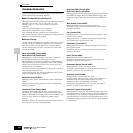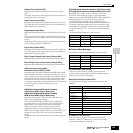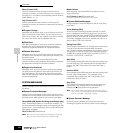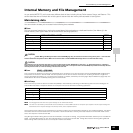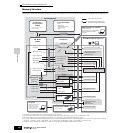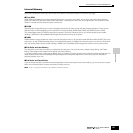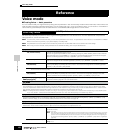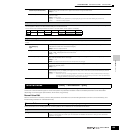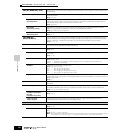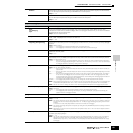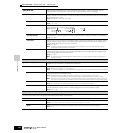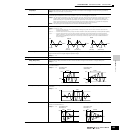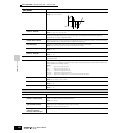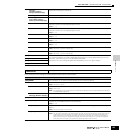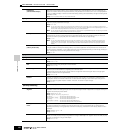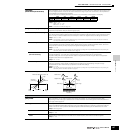
Reference Voice Mode
Voice Edit mode Normal Voice Edit Common Edit
190
Owner’s Manual
[SF2] PLY MODE (Play mode)
From this display you can make various settings for the tone generator of this synthesizer, and assign different Micro
Tuning settings.
Mono/Poly Determines whether the Voice is played back monophonically (single notes only) or polyphonically multiple
simultaneous notes).
Settings: mono, poly
KeyAsgnMode
(Key Assign Mode)
When this is set to “single,” double playback of the same note is prevented. This is useful when two or more
instances of the same note are received nearly simultaneously, or without a corresponding note off message. To
allow playback of each instance of the same note, set this to “multi.”
Settings: single, multi
M. TuningNo.
(Micro Tuning Number)
Determines the tuning system for the voice. Normally, this should be set to 00 (Equal temperament); however
additional tuning systems are available for a variety of tuning applications and effects.
Settings: See the Micro Tuning List on page 209.
M. TuningRoot
(Micro Tuning Root)
Determines the root note of the Micro Tuning set above.
Settings: C ~ B
[SF3] MEQ OFS
(Master EQ Offset)
From this display you can adjust the master (global) EQ settings for the entire Voice. The settings made here are
applied as offsets to the EQ settings (with the exception of “MID”) from the Utility mode, with the following operation:
[VOICE] → [UTILITY] → [F3] VOICE → [SF1] MEQ. You can edit these parameters by using the Knobs.
Settings: -64 ~ 0 ~ +63
[SF4] PORTA (Portamento)
This display allows you to set the Portamento related parameters. Portamento is used to create a smooth transition in
pitch from the first note played on the keyboard to the next.
Switch Determines whether Portamento is applied to your keyboard performance using the current Voice or not.
Settings: off, on
Time Determines the pitch transition time. Higher values result in a longer pitch change time, when Time Mode below is
set to “Time.”
Settings: 0 ~ 127
Mode Determines how the Portamento is applied to your keyboard performance.
Settings: fingered, fulltime
fingered............Portamento is only applied when you play legato (playing the next note before releasing the previous one).
fulltime..............Portamento is always applied.
TimeMode This determines how the pitch changes in time.
Settings: rate1, time1, rate2, time2
rate1.................Pitch changes at the specified rate.
time1 ................Pitch changes in the specified time.
rate2.................Pitch changes at the specified rate within a octave.
time2 ................Pitch changes in the specified time within a octave.
LegatoSlope Determines the speed of the attack of legato notes, when Switch above is set to on and Mono/Poly is set to mono.
(Legato notes “overlap” each other, the next being played before the previous is released.) The higher the value, the
slower the attack rate.
Settings: 0 ~ 7
[SF5] OTHER
From this display you can set the control functions for the Knobs, and determine the up/down range for the Pitch
Bend wheel.
Knob Assign Determines the function for the assignable Knobs (1-4). Pressing the [KNOB CONTROL FUNCTION] button on the
panel sets the desired function row, which is automatically stored to memory with the currently selected voice.
Settings: pan, tone, assign, MEQofs, MEF, arpFx
PB Upper
(Pitch Bend range Upper),
PB Lower
(Pitch Bend range Lower)
These two parameters determine the pitch change range of the Pitch Bend wheel.
Settings: -48 ~ 24
AssignA, AssignB,
Assign1, Assign2
Simply tweaking the knob with setting the Knob Assign (above) to “assign” to the desired value, which is
automatically stored to memory with the currently selected voice.
[F2] OUTPUT
Volume Determines the output level of the Voice.
Settings: 0 ~ 127
Pan Determines the stereo pan position of the Voice. You can also adjust this parameter using the PAN knob on the front
panel.
Settings: L63 (Left) ~ C (Center) ~ R63 (Right)
n When a stereo Voice is selected, this parameter setting may not be effective. Voices with Elements set to opposite Pan settings
(set in [F4] AMP → [SF1] LVL/PAN → Pan) — i.e., one at L63 and another at R63 — are considered stereo Voices.



